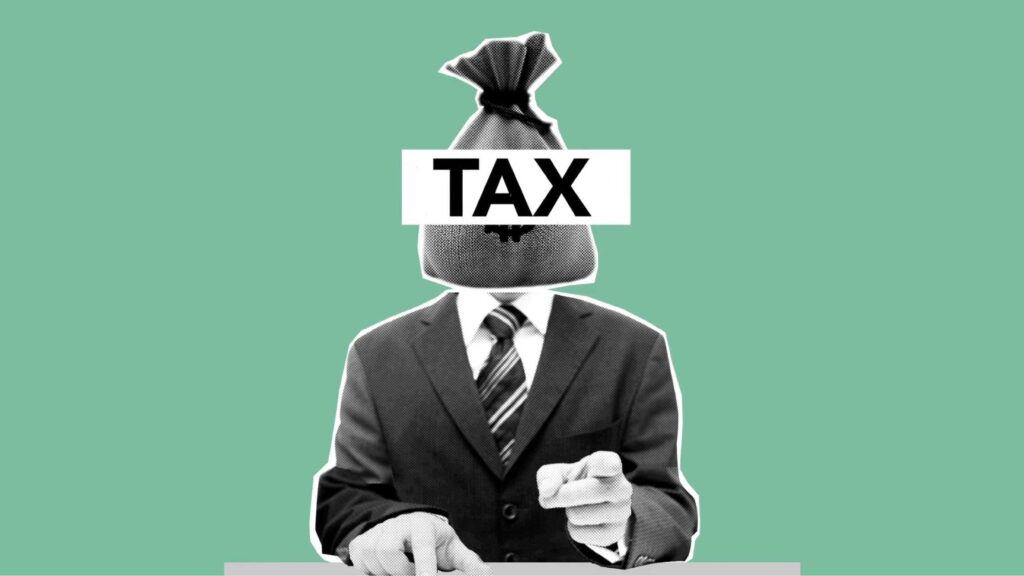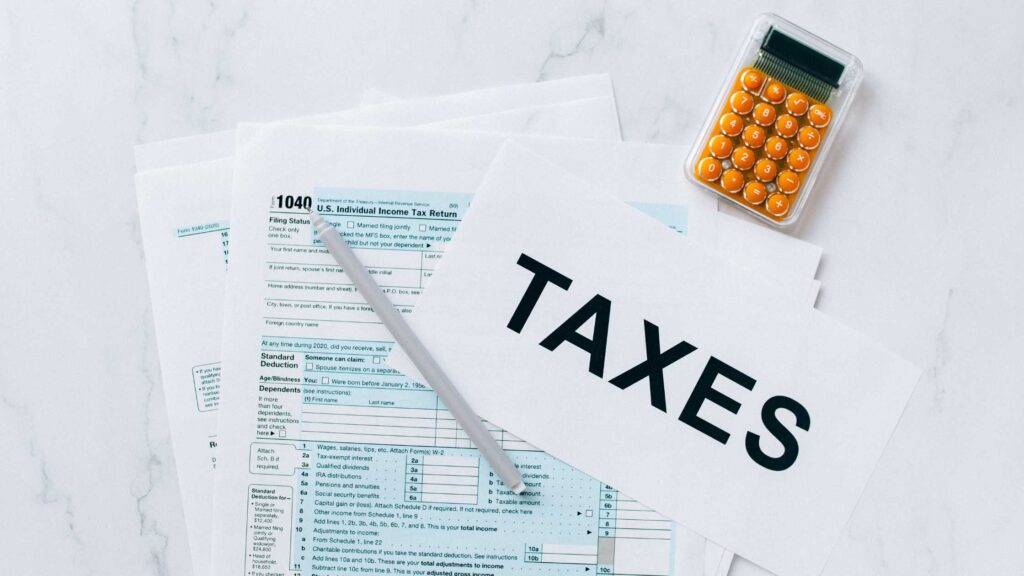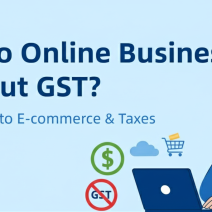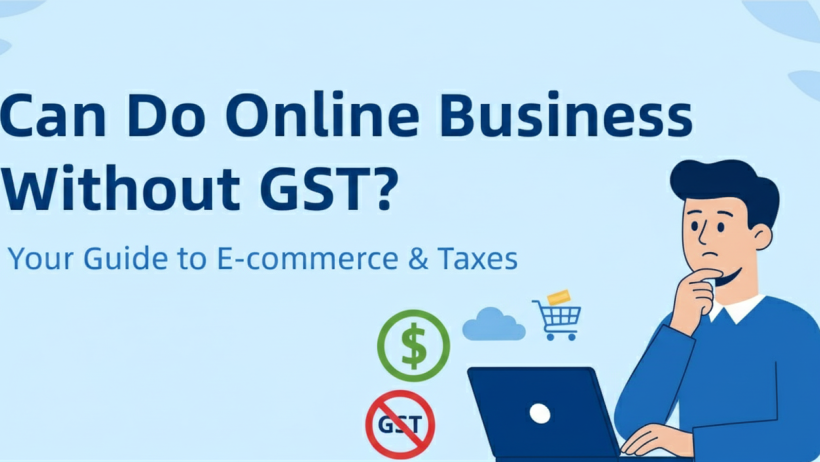Online Business Without GST : The world has shifted rapidly towards digital-first economies, and India is no exception. With affordable internet, widespread smartphone usage, and digital payment adoption, starting an online business in India has become easier than ever before. Millions of small entrepreneurs, freelancers, and home-based sellers are entering the online marketplace to build income streams. From selling handmade crafts on Insta to freelancing as a content writer or building a dropshipping store, the scope is unlimited.
Table of Contents
But with opportunity comes responsibility, and one of the most confusing areas for new entrepreneurs is tax compliance—particularly the Goods and Services Tax (GST). GST was introduced in India in July 2017 to replace a complex system of multiple indirect taxes and create a unified national tax framework. Today, GST is applied on almost all goods and services.
However, a common question arises: “Can I run an online business without GST?” The answer is not as simple as a yes or no—it depends on the type of business, turnover, sales channel, and long-term goals. In this blog, we will break down every detail you need to know about GST and online businesses, so you can confidently decide whether you can legally and profitably run your business without GST in India.
Understanding GST – The Basics

Before diving into rules and exemptions, let’s quickly understand what GST is and why it matters.
What is GST?
GST or Goods and Services Tax is a destination-based indirect tax levied on the supply of goods and services. It merges multiple taxes like VAT, service tax, and excise duty into one system. GST is categorized into:
- CGST (Central GST) – collected by the central government.
- SGST (State GST) – collected by the state government.
- IGST (Integrated GST) – collected for interstate trade.
Why GST Matters for Online Businesses
- Legal compliance – Avoid penalties and legal risks.
- Marketplace requirement – E-commerce platforms demand GST for seller registration.
- Input Tax Credit (ITC) – Businesses can claim back taxes paid on raw materials or services.
- Trust and transparency – Customers often prefer GST-registered businesses.
Also Read : How to start a Theme Building Business in 2025 – A Comprehensive Guide
Can You Do Online Business Without GST?
The short answer: Yes, you can, but with conditions.
Whether or not you need GST depends on several factors:
1. Annual Turnover Threshold
- For goods suppliers, GST is mandatory if turnover exceeds ₹40 lakhs (₹20 lakhs in special category states).
- For service providers, the limit is ₹20 lakhs (₹10 lakhs in special category states).
If your turnover is below these limits, GST registration is not compulsory.
2. Sales Channel Used
- If you sell on e-commerce platforms like Amazon, Flipkart, or Meesho, GST is mandatory regardless of turnover.
- If you sell on your own website, WhatsApp, or Insta, you don’t need GST below the threshold.
3. Location of Sales
- Selling within your state may not require GST under limits.
- Selling across states often requires GST even if turnover is small.
4. Nature of Business
- Freelancers, bloggers, consultants, and digital marketers can operate without GST until they cross ₹20 lakh turnover.
- Physical product sellers usually need GST sooner, especially if scaling via online marketplaces.
Scenarios Where You Don’t Need GST
Let’s explore practical examples where online businesses can operate without GST:
- Freelancer income: A content writer earning ₹10 lakh annually via Upwork does not need GST.
- Social media sellers: A homemaker selling hand-painted mugs on Insta with ₹5 lakh annual turnover can run without GST.
- Local services: An online yoga trainer charging ₹1.5 lakh annually can avoid GST.
- Digital products on own site: An entrepreneur selling e-books via PayPal with ₹8 lakh turnover is exempt.
Scenarios Where GST is Mandatory
On the other hand, GST becomes compulsory in these cases:
- Selling through Amazon, Flipkart, Myntra, or Meesho.
- Dropshipping and cross-border e-commerce.
- Providing services across states exceeding limits.
- Claiming Input Tax Credit.
- Supplying digital services to international clients where GST compliance may be triggered.
Advantages of Doing Online Business Without GST
✅ No filing hassle – You avoid monthly GST returns.
✅ Lower compliance costs – Save on accountants and tax consultants.
✅ Simple invoicing – No need for GST invoices, just simple bills.
✅ Good for beginners – Perfect for testing business ideas without heavy obligations.
Disadvantages of Doing Online Business Without GST
❌ Limited growth – Can’t scale on big e-commerce platforms.
❌ No ITC claims – You cannot reduce costs by claiming tax credits.
❌ Credibility issues – Larger clients may not work with non-GST businesses.
❌ Risk of penalties – If you cross limits unknowingly, you may face fines.
Types of Online Businesses and GST Applicability

1. Freelancing and Service-Based Businesses
GST not required until ₹20 lakh. Writers, designers, marketers, consultants fit here.
2. Bloggers and Content Creators
Income from AdSense, sponsorships, and affiliate marketing is taxable as services. GST applies above ₹20 lakh.
3. E-Commerce Sellers
GST is always mandatory. Platforms don’t allow sellers without GSTIN.
4. Digital Product Sellers
If you sell through your website, GST optional under threshold. Through third-party platforms, GST required.
5. Dropshipping Businesses
Since products move interstate, GST mandatory regardless of turnover.
Buy Now : Ecommerce Website
GST Registration Process for Online Business
For those who decide to register, here’s the step-by-step process:
- Visit the GST portal (www.gst.gov.in).
- Click “New Registration” and fill Part A with PAN, mobile number, and email.
- Complete Part B with business details, bank account, and documents.
- Upload documents like PAN card, Aadhaar card, address proof, and photographs.
- Submit application using Digital Signature Certificate (DSC) or Aadhaar e-sign.
- Receive GSTIN (Goods and Services Tax Identification Number) after verification.
FAQs About GST and Online Business
Q1: Can I sell on Amazon without GST?
No. Amazon and similar platforms require GST registration.
Q2: Can freelancers avoid GST forever?
Only if their annual income is below ₹20 lakh. Above that, GST is mandatory.
Q3: Can I do affiliate marketing without GST?
Yes, until your annual earnings cross ₹20 lakh.
Q4: Can I register for GST voluntarily?
Yes, many businesses register early to build credibility.
Q5: What happens if I ignore GST when required?
You may face fines, penalties, and platform restrictions.
Future of GST in Online Business
As digital businesses grow, government monitoring of online transactions is increasing. With the rise of UPI and digital payments, authorities can track income more easily. It is expected that in the future, GST exemptions may be reduced, and even small online sellers may be asked to register. Preparing early gives businesses an edge.
Expert Tips for Entrepreneurs
- Start without GST if your turnover is small but track income carefully.
- Plan growth—if you want to sell on big platforms, get GST early.
- Use simple accounting tools like Tally, Zoho Books, or QuickBooks.
- Consult a CA or tax expert before crossing turnover thresholds.
- Don’t avoid GST just to save money—think long-term scalability.
Conclusion – GST or No GST for Online Business?

So, can you do online business without GST? Yes, but only up to a point. If you’re a freelancer, small digital product seller, or social media entrepreneur with annual turnover below ₹20 lakh for services or ₹40 lakh for goods, you can operate without GST. But as soon as you scale, expand across states, or join e-commerce platforms, GST registration becomes unavoidable.
Buy Now : Ecommerce Website
In short, GST is not a barrier but a stepping stone. It may look like compliance overhead at first, but in reality, it opens doors to growth, credibility, and larger markets. Use the non-GST stage as your testing ground, but be prepared for GST when your business reaches the next level.
Disclaimer
This blog is intended for informational purposes only and should not be considered legal or financial advice. GST laws are subject to changes by the Government of India. Please consult a qualified tax professional or chartered accountant before making decisions related to GST compliance for your online business.
Keywords : Online Business Without GST – Online Business Without GST in 2025







